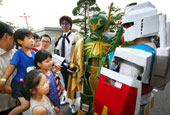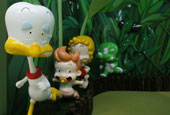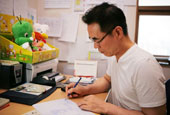Baduk is the Korean word for game of go, the ancient Asian strategic board game. At first, the quote just sounds like a story about two go players competing in a game. However, it's actually one of the best known lines from “Misaeng“ ("미생," "未生"), a famous online comic strip.
Misaeng literally means, "an impossible life," a word usually used when playing go. The comic strip tells the story of a man named Jang Geu-rae who failed to become a professional go player and starts a new life as a white-color office worker. Many readers sympathized with the realistic portrayal of the character who struggles to overcome difficulties and to adjust himself to the workplace. Fans also praised the narration in the story that compared the lives of workers to a game of go. In 2014, a TV soap opera was produced based on the original artwork, winning ever higher ratings with no love story and no heroics. “Misaeng” and its main character, Geu-rae, have since become two important keywords that represent many aspects of modern Korean society.
The creator of “Misaeng” is Yoon Taeho. Thanks to his earlier works such as “Moss,” a thriller, and “The Insiders,” a story about social corruption, he already had many fans before beginning "Misaeng." These works have now all been remade as films, all of them winning great reviews.
Korea.net sat down with Yoon to learn more about his life, his thoughts about the world of comic art and about his beliefs in comic strips. Yoon recently received the top prize at the Bucheon Comics Award for his graphic novel “Operation Chromite" (2014), a historical work spanning Korean independence from Japanese colonization in 1945 through to the Korean War (1950-1953).
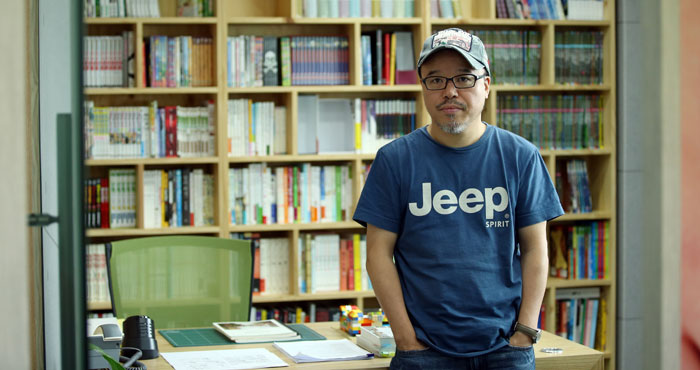
Yoon Tae-ho, creator of ‘Misaeng,’ says becoming a comic artist was his destiny.
What made you become a comic artist?
When I was little, I grew up reading the works of Huh Young-man. This led me to become a cartoonist. If I hadn't read his books, however, I believe I would still have become a comic strip artist. My family wasn't rich enough to support me in art college, but I loved drawing and making graffiti, so I guess would still have become a comic book creator.
It may seem to be a silly question, but could you please tell us the name of one of your favorite comic artists and which work of theirs impressed you, and why?
I wasn't able to read many comic books or graphic novels as a kid, since I grew up in the remote countryside. There were some editions by Huh Young-man, so I read those for a few years. I liked his drawings and the way he produced the story.
In your comic strips, you seem to deal with many characters who are in difficult situations, for example a high school graduate who failed to become a professional go player, or a divorced man who lost everything, including his family. Why do you take an interest in such characters?
Technically speaking, from the comic makers’ point of view, it is more interesting to create a story about characters with weaknesses. Personally, I don't know much about the stories of people who've had an easy life. I've never experienced that. I have more ideas about people who grew up enduring hardships. I didn't intend it, but I tend to write more about characters with whom I'm more familiar.
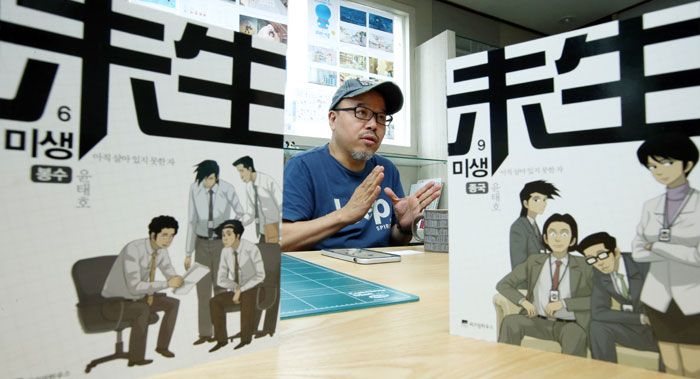
’Misaeng’ received great reviews from its readers, as it tells stories of long-suffering office workers and how they overcome difficulties, all while comparing life to the world of go.
From "Misaeng," to "Moss," "Operation Chromite" and to "Pain-Bumpkin," which you've been working on recently, the theme of your works vary. Where do you get inspiration for such creations?
In the case of “Moss,” I thought I should do an intense thriller after undergoing a slump and suffering from money problems over a long time. Regarding “Misaeng,” my publisher suggested I do a story about a salaryman and the game of go.
In regard to “Operation Chromite,” it began with my concerns about youth who show tendencies toward right-wing extremism and conservatism. When looking into the history books, there were extreme right-wing youth groups immediately after Korean independence. I think they followed their desire to survive, rather than any ideology. Similar groups exist online today, but they didn't come about suddenly. They've always existed.
After thinking deeply about them, I decided to do a story that starts at independence. It seems the past governments didn't solve the issues regarding independence and post-independence in an appropriate manner. The general public were consumed and sacrificed in the process.
When you look closely at our history, South Korea got richer after a war that ended in separation. However, we were not free from the trauma of division during all this time. I think all our limitations and our limited freedoms are rooted in national division. This is why I wrote “Operation Chromite.”
The reason why I started making “Pain-Bumpkin” is because, when thinking about the older generation from our parents' years, I guessed that even thieves would live their life to the fullest. Though they do bad work on the outside, they could be good parents at home to their children, for example. I guessed that Korean society hasn't yet completely emerged from its era of industrialization. Parents can't get enough sleep. They have to make money to pay for their kids' education so that they can have a better life. Their grown-up children also do the same for their kids. In the end, it seems that money is everything in the world, and this is because of an era defined by economic development. The arts and beauty is not something to which we can go back and enjoy after we get better-off. Even if we are poor, we still need to enjoy the benefits of the arts. To be a righteous person, one needs to grow up based on the foundation of a balanced life, between survival and culture. The past generations of our fathers, however, spent their lives making their country richer and stronger, without any chance to read a book or watch a movie. For this reason, I portrayed people who are obsessed about money.
Look at it this way. To write 100 books, you don't need 10,000 new ideas. As long as you have a clear mindset, you can just talk about one of the layers of your life. I've never met anyone in the creative arts who's obsessed about ideas.
Many workers sympathize with the main character in "Misaeng," Jang Geu-rae. What message did you hope to send through this comic strip?
I didn't think about sending any message, as I never experienced life as an office worker. I regretted a lot after I agreed to publish the story and signed the contract. Office drones are better educated than I am. I knew nothing about their world. I couldn't interview any white-collar workers or companies. When I was writing the strip, I thought it would be a hellish experience. I was prepared for that. However, once the themes were selected, I realized that the lives of white-collar office drones aren't any different from the lives of others. They spend most of their time working and then drop by home shortly in the evening. They have a desire to do a good job and tend to be overworked. It wasn't really that different. I thought that life would be the same and difficult for everyone in their 30s or 40s. I didn't intend to deliver any lesson through my story. Some people reflect upon their own lives by looking at others, even though they don't mean to. As such, I thought I could make readers rediscover themselves through my comic.
From one's minute daily routine to the huge canvas of history, you deal with a wide range of topics. It seems that you are full of ideas. You seem to need a lot of reading, or other forms of indirect experience, like dialogue, and that you go through a lot contemplation to make your works of art. Why do you deal with somewhat negative or serious issues?
If I had gotten into college, it would have been in 1988, though I didn't. I don’t think I could have been free from the reflections of the times. From the political turmoil during the process of democratization, to the Asian financial crisis, to the development of IT to today’s rapidly changing situation, I can't think of myself without considering the society around me. I didn't mean to make social commentary through my works. It's rather because this is all I learned when growing up. It's not because I wanted to deal with such grave issues, but because I can only have ideas in these areas. I would doubt myself if I were thinking about making happy stories, like those by many young comic strip artists today.
“Operation Chromite” vividly reveals the conflict between people who stayed in Seoul and those who fled across the Hangang River after the Korean War broke out. This is one of the painful parts of modern Korean history that the history textbooks don't always talk much about. By disclosing such facts, which some people want to hide, what lessons did you hope to share?
“Operation Chromite” is based on books by Professor Kang Chun-man of Chonbuk National University and the daily records of the yearbook of the National Institute of Korean History. I questioned why Kang's books are always read by only a few people who are already familiar with his points of view. I hoped that readers, especially younger readers, would be able to talk together through comic strips.
Many events with historic importance are recorded in the daily record of the yearbook of the National Institute of Korean History, not just information about the people who crossed the river. I thought a lot about which items to select and to include in the story. Making a history textbook would depend on which historical understanding the textbook publisher has, and which historical facts it chooses to publish. It is a difficult job to do. This is why history textbook publishers take on a grave responsibility. In this regard, I wanted to actively talk about the unknown truths that are not clearly written about in many textbooks. I didn't regard this work as just a comic strip. It does include fictional features, but they were just tools used to better deliver the historical truth. I wanted to deliver the historical truth through this narration.
You experienced a lot of personal hardships, including being homeless at one point. What was the most difficult, unforgettable moment in your past?
Being homeless wasn't actually that difficult. I always had some feeling of loss in the past. After getting married and having children, I suddenly felt happiness, which made me struggle to find new ideas because I always created works with some sort of negative energy. When my life was suddenly filled with the feeling of happiness, I didn't know what to do because I had never experienced it before. It was a slump that lasted about three or four years, before starting “Moss.”
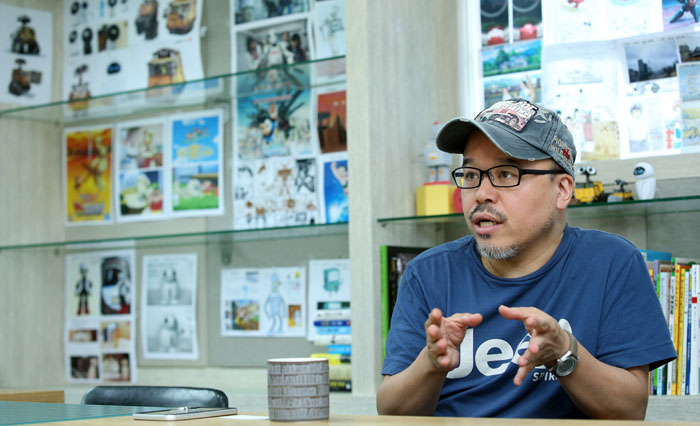
Yoon praises the potential for online comic strips, saying that combining media and technology can create new content.
In Korea, comic strips have gone online and are published electronically. In the U.S., in comparison, comics are still published in a magazine format, such as Marvel Comics, winning great popularity and being made into Hollywood blockbusters. What do you think is the future of online publishing? What advantages does it have in your view?
Books can be inconvenient, firstly, because we need to carry them and buy them from a store. In the case of online comic strips, however, anyone can read them from a computer or a smartphone. Computers and smartphones are not just for reading comic strips, however. For many users, they are convenient devices because they can do all sorts of other activities as well.
With online publishing, it's easier to gauge readers' responses through immediate feedback. However, it takes at least three months in the case of traditional comic books.
In this regard, online comics and graphic novels have great potential and can become a lot more convenient. They can be made into a new form of content mixed with all kinds of multimedia. Think of the film “Avatar.” You can't distinguish which part is film and which is animation. Online comic strips can be like that, actively combining comics, visual and sound effects. It would be new interesting content, combining many ideas from all sorts of media in a more convenient manner.
When I first entered the Web cartoon industry, to be honest, I didn't have firm faith in concentrating solely on doing comics offline. This has changed as much as possible. This is the charm of online content, I believe. Its biggest attraction is that it has no borders. This can be seen with “Moss,” which is beginning to gain traction in the U.S. after Huffington Post started publishing it this month. It will be good to be open to the new possibilities and to have less reluctance to change.
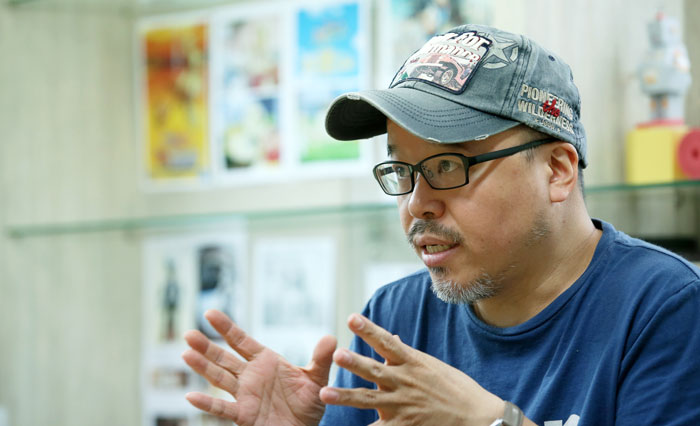
Yoon emphasizes the importance of understanding one's strengths and weaknesses for those who want to become comic book artists.
When looking at your work, a comic book artist should be a master in all areas, including history, society, characters and politics. What advice would you give to those who wish to become comic book artists?
Understanding yourself is the most important thing. This applies to all works, not just in the creative arts. People need to understand themselves, strengthen their merits and make up for their weaknesses. In my case, my strength was making historic records for each of the characters, and databases. Creators like cartoonists have fewer chances to read books. This is especially true for those who publish works on a regular basis. They need to have some sleep whenever they have time. Personally, I haven’t slept for three days. Such people have fewer opportunities to have indirect experiences. As I know about my weaknesses, I make sort of partitions, a personal history of each of the characters, and set up personalities and limits. Readers emphasize empathize with these characters, as they also have limits and have experienced conflict.
Through self-understanding, we can come out with a solution. You don’t need to judge yourself or think that you are not talented. Learning about your strengths and weaknesses is important in order to strengthen your talent. I believe the humanities are the tool for self-reflection and understanding. Those who are lazy in studying cannot better know themselves.
The creative power of comics is endless. How can the creative power of comics contribute to society, in your view?
We could live without comics or graphic novels. It would not harm the whole of humankind if comics ceased to exist. I've never discussed comics in a macroscopic view, but comics are something at which I can do my best. I hope my readers can feel the same feeling of reward that I get from my hard work. This is my wish, in terms of the social contribution of comics. I hope my readers can have the feeling of a reward through my works and my energy. It would be the same for anyone.
In regard to the creative potential of comic books, I believe the government's support policy for the source content industry is important. Source content industries, such as comics or pure literature, don't make as much profit or have as many performances as film, video games or cartoons. However, films, video games and cartoons are made from them. This is why we need to foster source content sectors, rather than other areas that create profit in a relatively short period of time. In this regard, I hope the government could carry our policies that are consistent and ongoing. I also hope that the government will be able to work on some less visible parts, such as establishing market order and making systematic improvements.
What is the best work, or the most precious work of yours, so far?
It would be “Romance,” which I published in a daily newspaper in 2002. The title means, "forget about getting old” in Korean. It is about senior citizens and is actually based on the story of my parents-in-law.
In the future, is there any area you hope to handle through your work?
So far, I haven’t thought about anything but making the second "Misaeng" series. It would be based in a small company. I guess it would be difficult to have interviews or to collect data. I guess I'll have another hellish time. Some people are full of ideas for their works, but I am not. I always make creations with ideas that come out of the very moment.
By Yoon Sojung
Photos: Jeon Han, Nulook Media, tvN
Korea.net Staff Writers
arete@korea.kr
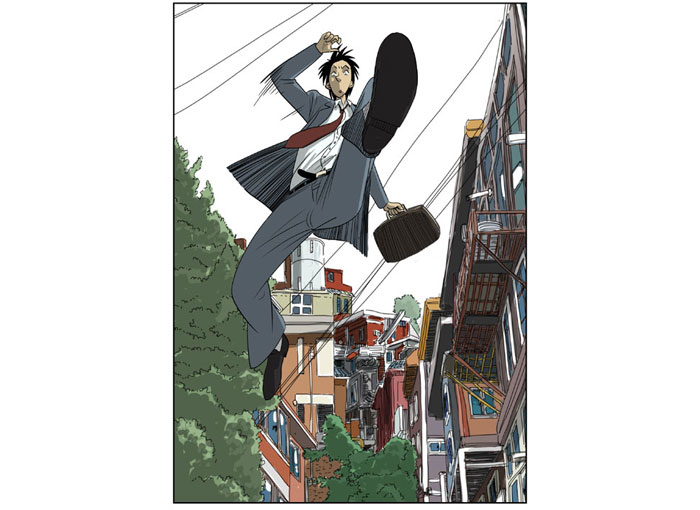
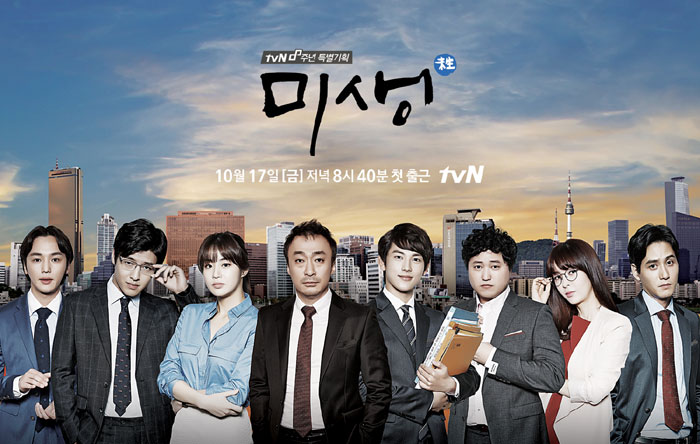
The online comic strip 'Misaeng' (above) was made into a soap opera last year and has been praised by critics and fans alike. The drama has been exported to 40 countries, including the U.S., China, Japan and to countries in Latin America.
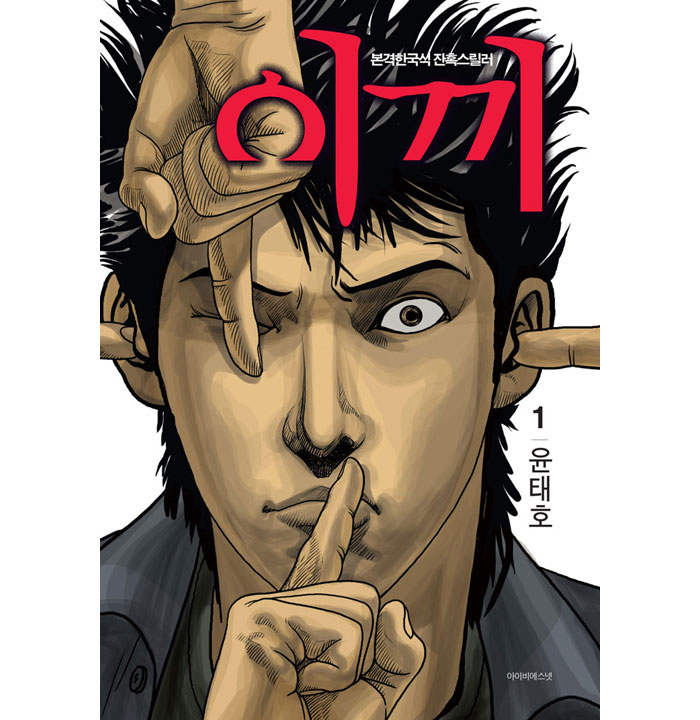
'Moss' tells the story of a man who reveals the truth behind his father’s death. It was also very popular online. It was later made into a film.
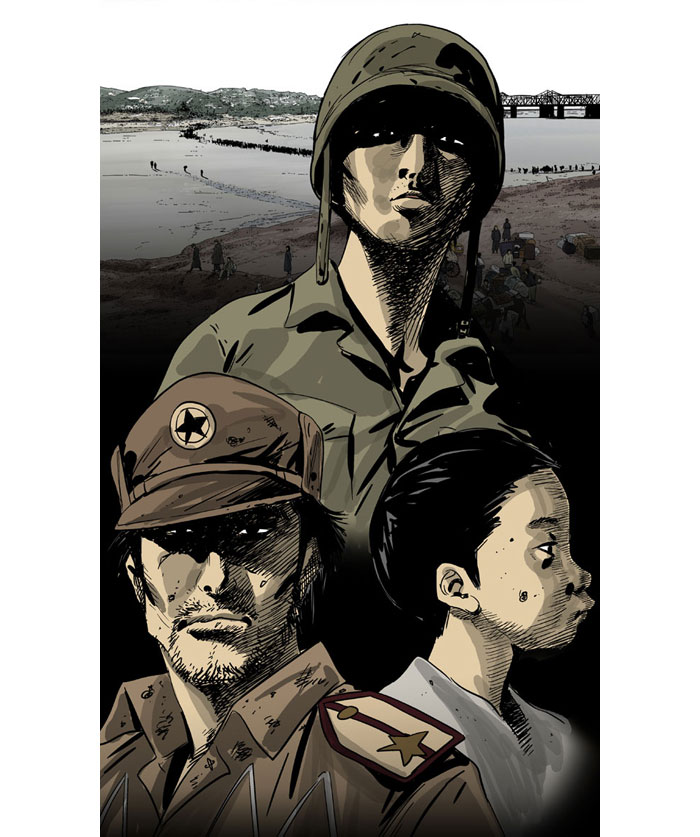
‘Operation Chromite’ tells of Korean history after independence and through to the Korean War. It recently won the top -ranked Bucheon Comics Award.
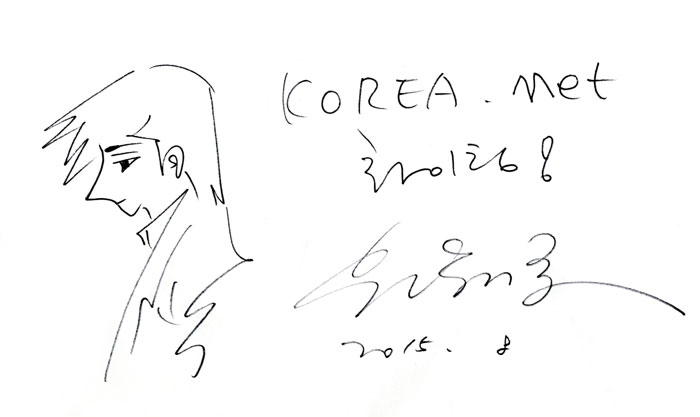
Yoon signs his autograph with a drawing of Jang Geu-rae, the main character of 'Misaeng'
